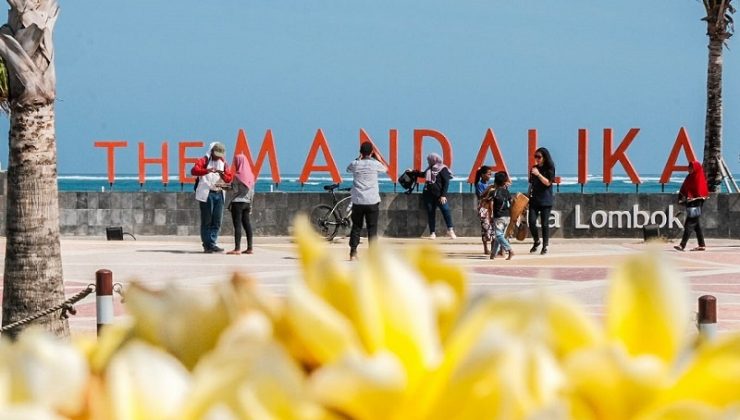THE application of an inclusive business model that involves the community, government and private parties can give new hope to the Indonesian tourism sector even in the midst of the COVID-19 pandemic that is sweeping the world.
The Innovation and Investment Project for Inclusive Sustainable Economic Development (ISED) for small and medium enterprises in two villages from July 2017 to June 2021 namely Bilebante and Sembalun, Lombok, West Nusa Tenggara (NTB) can be an example.
“Fellow beneficiaries from tourist villages in Bilebante and Sembalun are assisted to be able to increase their capacity in running a business in an inclusive manner as shown by the various involvement of members of the village community which leads to increased income and job opportunities for rural communities,” Acting Deputy for Economic Affairs, Ministry of National Development Planning, Amalia Widyasanti said.
The concrete manifestation of this project includes the development of fitness tourism in Bilebante Village, Central Lombok together with the Ministry of Tourism and Creative Economy and the Martha Tilaar Group, and the enhancement of local culinary potential by the Ministry of Villages, Development of Disadvantaged Areas, and Transmigration.
Meanwhile in Sembalun Village, East Lombok, the Ministry of Villages, Development of Disadvantaged Areas, and Transmigration and Anomali Coffee Group were developing the potential for local coffee and good coffee farming practices.
On that occasion, Deputy for Production and Marketing, Ministry of Cooperatives and SMEs, Victoria br. Simanungkalit argues, the selection of an inclusive business model in the two villages in Lombok is sustainable to create jobs, increase human resource capacity and provide benefits to the community which are not temporary.
From the program side, there are empowerment packages that are included, for example, as is done by the Panorama Group in the form of providing education to local communities creating attractive and nature-based tour packages or training on therapists to support tourism by Martha Tilaar Group.
Researcher and Professor of Law from Atma Jaya Catholic University, Jakarta, Prof. Ida Bagus Rahmadi Supancana positively assessed the ISED project even during the current COVID-19 pandemic.
“I see this is the right momentum to prepare competent human resources to match industry needs and help prepare themselves for a new normal situation which later becomes a phenomenon in the future,” he said.
As a form of support, according to Ida Bagus, the government needs to create policies that explicitly adopt an inclusive business model with all its advantages and provide incentives for business actors who show concern for society. These incentives can be in the form of taxes, ease of licensing and access to funding.
Collaborative experience in Lombok
Martha Tilaar Group is one of the business actors who took part in the ISED project this time. They empower women in Bilebante Village through massage skills, because this can be part of the tourist attractions there.
Martha Tilaar Group’s Corporate Communication, Palupi Candra said, the massage skills taught include correct massage techniques, introduction to physiology and anatomy of the body as well as an understanding of hospitality.
“Not many people understand, but the massage technique has knowledge, there must be basic knowledge about the anatomy and physiology of the body. Massage is not just a massage, there are muscle grooves that they have to touch,” she said.
“Friends (in the village) are very enthusiastic. Massage is not just a massage, there are muscle grooves that they have to touch, the excitement of the game is getting stronger considering this is a potential tourism village,” Palupi added.
Not only about massage, the villagers also received education on how to use empty land into herbal gardens which later could increase family income while increasing their creativity in creating products from planted herbal plants.
During the COVID-19 pandemic, this herbal garden could also be an attraction with products in the form of health drinks that can increase the body’s immune system.
Meanwhile, in Sembalun Village, empowerment was carried out targeting the potential of natural products there, namely coffee. Anomali Group has the opportunity to provide an understanding to local residents who cultivate coffee and are ready to become buyers if the production is according to company standards.
Representative of Anomali Coffee Shop, Ryo Limijaya, said the company where he works is ready to continue to provide feedback if it does not meet standards later.
In addition to cultivation, they also provide special training including inviting selected villagers to Jakarta to learn to run a coffee shop business or become trainers who can pass on their knowledge to their colleagues in different villages.
“As a result, some have opened a coffee shop and are running, some don’t even want to open a coffee shop but become trainers and are inspired to have schools (training) around Lombok. This is an extraordinary story,” Ryo noted.
He said, during the COVID-19 pandemic, the coffee shop business should be able to continue running in the village, as long as the business actors there are able to understand who the local buyers are, how people whose living areas are close to the business location can buy products and of course in When the world becomes limitless as it is today, digitalization of business cannot be ruled out. Selling using digital platforms also needs to be done. [antaranews/photo special]
















